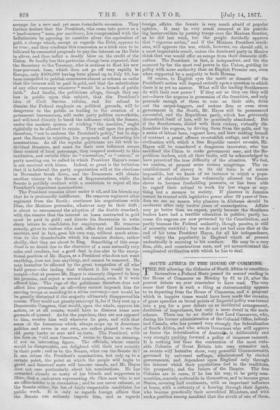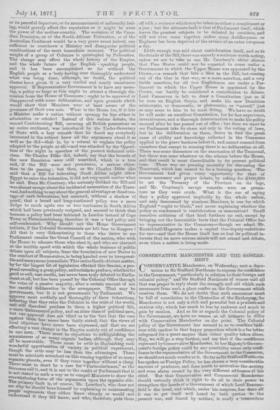SOUTH AFRICA IN THE HOUSE OF COMMONS.
THE Bill allowing the Colonies of South Africa to constitute themselves a Federal State passed its second reading in the House of Commons on Monday by 81 to 19, after the poorest debate we ever remember to have read. The very sense that there is such a thing as statesmanship appears to be departing from the House of Commons, and a proposal which in happier times would have been made the occasion of great speeches on broad points of Imperial policy was turned into a peg for a poor debate on an incidental arrangement, doubtless of importance, but only a mere detail in the main scheme. There can be no doubt that Lord Carnarvon, who, during his former administration of the Colonial Office, federal- ised Canada, who has pressed very strongly the federalisation of South Africa, and who selects Governors who will approve or foster the federalisation of Australia, is deliberately and very strongly pushing forward a policy of immense moment. It is nothing less than the conversion of the most valu- able Colonies of Great Britain into very extensive and, as events will hereaftei show, very powerful Commonwealth governed by universal suffrage, administered by elected governments, and dependent upon England only through the interest which their populations feel in the traditions, the prosperity, and the future of the Empire. The free Colonies are to cease, if he has his way, to be petty com- munities, scarcely noticeable in themselves, and to become great States, covering half continents, with an important influence at home, with a certainty of a hearing through their Agents, who become practically their accredited Ministers, and with such a position among mankind that the revolt of one of them,
or its peaceful departure, or its announcement of unfriendly feel- ing, would gravely affect the reputation or it might be oven , the power of the mother-country. The secession of the Cana- ' than Dominion, or of the South-African Federation, or of the Australian Continent would be a very grave event indeed, one
sufficient to overthrow a Ministry and disorganise political combinations of the most immediate moment. The political 'weight of a -group of Colonies is quintupled by Federation. The change may affect the whole history of the 'Empire, and the whole future of the English - speaking people, and it has been accomplished so far without the English people as a body -having ever thoroughly understood 'what was being done, although, no doubt, the political classes have given it a very cordial and nearly unanimous approval. If Representative Government is to have any mean- ing, a policy so large as this ought to attract a thorough dis- cussion from the House of Commons ; ought to be approved or disapproved with some deliberation, and upon grounds which would show that Members were at least aware of the greatness of their own acts. What is the House for, if it lets a Minister make a nation without opening its lips either in admiration or rebuke? Instead of this serious debate, the second Confederating Bill, covering all British possessions on an entire continent, was introducx1 by the Under-Secretary of State with a lazy remark that he dared say everybody interested in the subject knew all the arguments about it as well as he did—that is, by a refusal to explain the policy adopted to the people at all—and was attacked by the Opposi- tion of the -night in speeches of the poorest technical criti- cism. 'Sir Charles Dilke did, indeed, say that the bounds of the new Dominion were still unsettled, which is a true and, if the Bill wore not permissive, a serious objec- tion to its passing ; but then, as Sir Charles Dilke also said that a Bill for federating South Africa might allow Egypt to enter the federation, it did not very much matter what he said. Even Mr. Courtney, who seriously disliked the Bill and 'was almost savage about the incidental annexation of the Trans- vaal,'had nothing to say about the general advantage or disadvan- tage of such federations, but assumed, without a shadow of proof, that a broad and long-continued policy was a more dodge to catch again one or two territories in South Africa which had been previously resigned, and seemed to think -that because a policy had been initiated in London instead of Cape -Town or Pietermaritzburg, therefore it was a bad policy and self-condemned. Why should not the Home Government initiate, if the Colonial Governments are left 'free to disagree? All that is very disheartening to those who desire to 800 Parliament remain the Great Council of the nation, who wish the House to educate those who elect it, and who are alarmed at the terrible speed with which the whole business of public 'debate upon all subjects, from the foundation of new States to the conduct of Home-rulers, is being handed over to irresponsi- ble and anonymous journalists. This entire South-African matter, • bylarthe largest bit of legislation effected this Session, a pro- posal revealing a great policy, and certain to produce, whether for good or evil, vast results, has never been truly debated in Palle- inent at all, but has been passed by the Colonial 'Office through the votes of a passive majority, after a certain amount of not too careful deliberation in the newspapers. That may be government, but it is not •government -by Parliament. We approve most cordially and thoroughly of these federations, 'believing that they raise the Colonies in the scale of the world, and will therefore produce in them a higher political life, _a more 'a-i§hlterested policy, and an abler class of political men, but our approval
does notblind us to the fact that the case against them has r never been expressed, and that we are i been fairly stated, that the views of local objectors have
affecting a vast change in the Empire mainly out of confidence in one man. There must be objections to extinguishing the separateness of so many organic bodies, although they may all be answerable. There must be evils in diminishing such wonderful opportunities of -variety in political experiment, though the evils -may be less than the advantages. There must be mischiefs attendant on this coming together of so many separate planets, even if they come together without -a clang. There must in short be a case for "Partieularismus," as the Germans call it, and it is not to the credit of Parliament that it is not -stated in such a way as to compel Ministers to show the overwhelminglorce of the arguments upon the opposite side. The 'Primary fault is, of course, Mr. 'Lowther's, who does not see why he should bore himself by explaining to uninteresting people arguments they either know already or would not understand if they did know, and who, therefore, puts them
off with a sentence which may be taken as either a compliment or a jeer ; but the ultimate fault is that of Parliament itself, which leaves the greatest subjects to be debated by outsiders, and will not even come together unless some Artilleryman or Engineer has been deprived of the arrears of an extra twopence a day.
Little enough was said about confederation itself, and as to the details of the Bill, there was scarcely a sentence worth noting, unless we are to take as one Mr. Courtney's °biter dictum that Free States could not -be expected to come under a Government in which the Upper -House was appointed by the Crown,—a remark that hits a blot in the Bill, but coming out of the blue in that way, as -a mere assertion, and a very feeble assertion, for all free Englishmen are under a Par- liament in which the Upper House is appointed by the Crown, can hardly -be considered a contribution to debate. Lord Carnarvon is left to draw a Constitution just as if he were an English Sieyes, and make his new Dominion aristocratic, or democratic, or plutocratic, or "mixed," just as may seem to him to be most fitting. We have no doubt he will make an excellent Constitution, for he has experience, inventiveness, and a thorough determination to make his policy succeed after he has passed out of office ; but then we want-to see Parliament take its share not only in the voting of laws, but in the deliberation on them, desire to find the :great mass of ability and knowledge collected in the Commons applied to the grave business before it, and cannot conceal from ourselves that except in seeming there is no deliberation at all. There was some discussion on the annexation of the Transvaal, but there was none whatever on the scheme before the House, and that result is most discreditable to its present political tone. There was no pressing necessity for discussing the Transvaal, which has ceased to be a burning question. The Government had given every opportunity for -that of course necessary and proper debate, by asking for L100,000 to set the Treasury of the Province on its 'legs, and Mr. Courtney's savage remarks were as prema- ture as they were crude. What is the use of saying that a policy approved implicitly by the whole nation, and only denounced by nineteen Members, is one for which England "ought to blush," and never explaining whether the policy so condemned is confederation or annexation ? Small assertive criticism of that kind furthers no end, -except by bringing out the lamentable facts that the Colonial Office has no representative in the Commons—though we admit Mr. Knatchbull-Hugessen makes a capital vice-deputy-substitute for one—and that the House itself has so lost its political -in- terests that its more serious minds will not attend -and debate, even when a nation is being made.



































 Previous page
Previous page